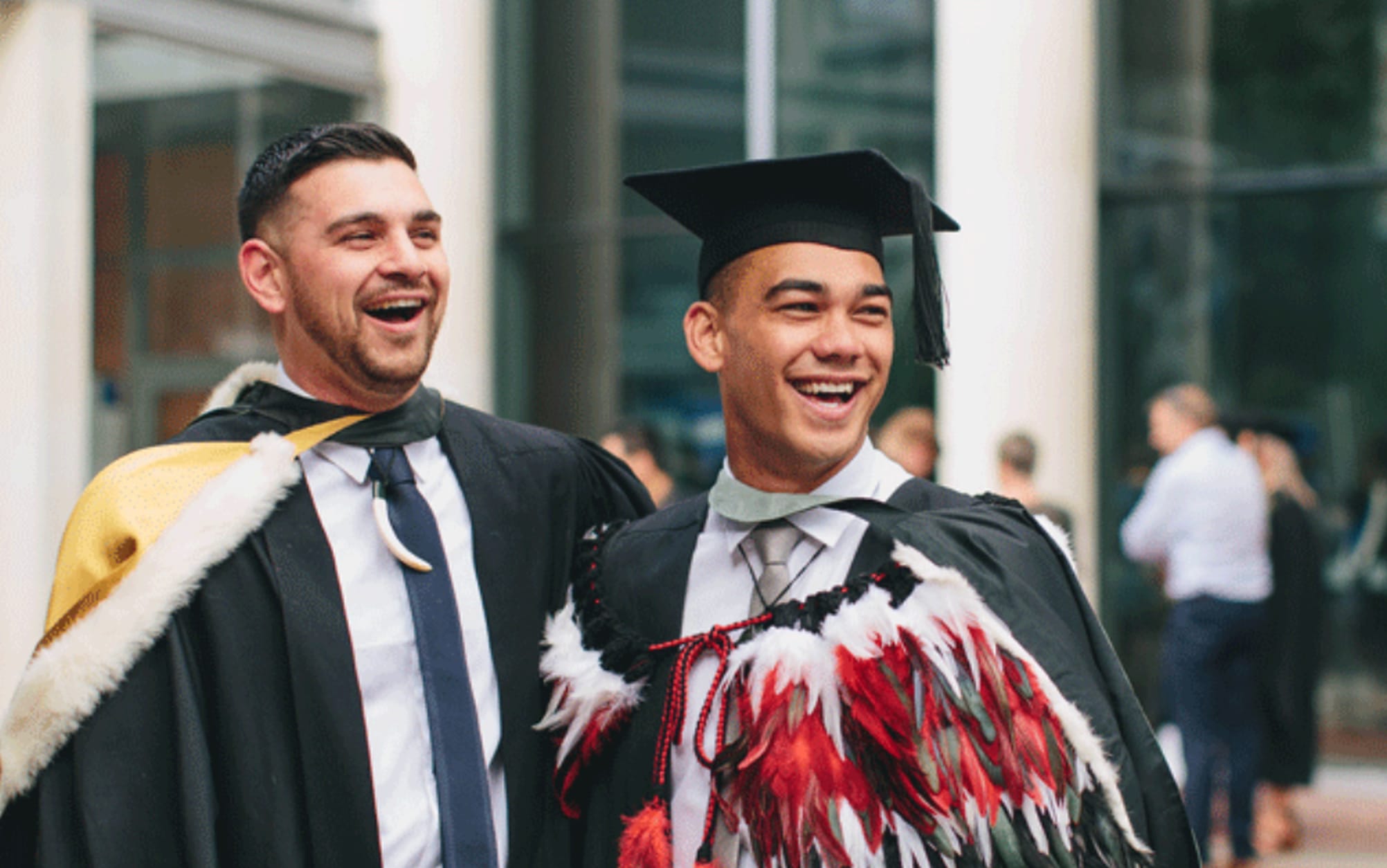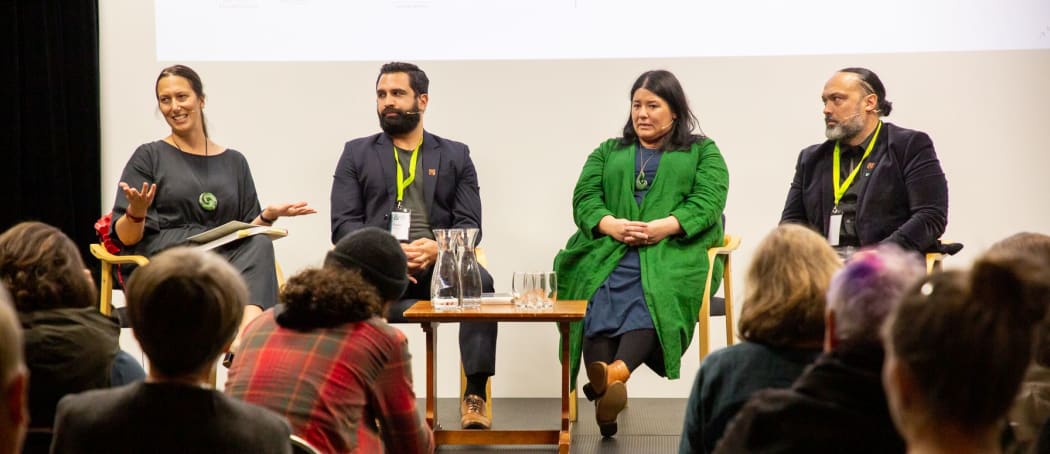Otago law professor Jacinta Ruru talks with fellow academics Renee Smith and Rawiri Tapiata about being Māori in a university.
A highlight of 2021's Dunedin Writers & Readers Festival.

Photo: University of Otago
Two books on Māori leadership have been published recently: Ngā Kete Mātauranga – Māori scholars at the Research Interface and Te Kai a te Rangatira.
The first details the success stories of 24 Māori academics, exploring how they have worked to bring their mātauranga Māori (or Māori knowledge) into their respective fields of scholarship and teaching. It seeks to demonstrate how mātauranga Māori can enrich Western-dominated disciplines of knowledge in the research sector.
The second book, Te Kai a te Rangatira, widens the focus from the university to the community, containing 100 interviews with Māori people who have a track record of service, leadership and contribution.
Prof. Jacinta Ruru discusses the rationale for the book she co-edited: Ngā Kete Mātauranga – Māori scholars at the Research Interface.

Prof. Jacinta Ruru, Rawiri Tapiata, Renee Smith, Marcus Akuhata-Brown Photo: Sharron Bennett
Jacinta Ruru:
I think we had two audiences here. One was our Māori whanau. We really wanted to speak to tell a real story of celebration. Māori are succeeding in the university sector. Māori can dream to do whatever they wish to do in any discipline and can succeed there. So there was a real story of pride in who we are as Māori.
The other audience is our leaders across Aotearoa New Zealand and particularly those tertiary educational institution leaders. To call for that decolonisation, [recognising] the importance of being the collective, rather than the individual. We need our tertiary institutions, Aotearoa New Zealand leaders to really understand that.
Those Māori who are not in Māori studies, but out there in the disciplines – in the Wild West really (I’m talking about my own experience of 20 years alone in the law faculty – we’re not enabled to work together in a collective way. We all talk about being lonely, isolated. We talk about our study. When you were studying, did you have any Māori teaching you? If you did it was probably one or two that came across you.
Jacinta Ruru:
And that’s still happening today. We’re having students coming into the tertiary sector that are not being taught by Māori. They could go through their whole degree and not read any Māori-authored work. So Māori work is not being prioritised in the curriculum. They’re not hearing Māori ideas.
These are really critical issues for us as a country. We’re calling for an “And/And.” We all fell in love with these Western theories. We still want that. We still need that. But we also need to be equally valuing our Māori knowledge, our indigenous knowledge. So we are really calling for that decolonisation.
We’ve got so much excitement and so much hope. And so much generosity in terms of what we’re giving, but it is really difficult. You just need to look at some of the statistics to see that Māori are sitting at a static 5% of staff in the universities.
Many of those may not have guaranteed positions, they’re reliant on bringing in research [funding], they’re at the lower entry-level positions. There are only three Māori across the whole tertiary sector – eight universities – who are at Head of Department or leadership level of a discipline that’s not Māori studies.
So what this is saying is that Māori can lead Māori, but can’t have any leadership roles that’s not in the discipline of Māori Studies. A glass ceiling? We’re talking about a concrete ceiling. It’s impossible to push through. But this is weird because we’ve got Māori who are highly successful. With international acclaim. We’ve got over 800 Māori with PhDs in recent years.
We often get told Māori need to do more. Actually no. They don’t need to do anything more. We’ve already shown we can succeed in this colonial university context. The colonial structures need to change. That’s where the onus needs to lie. So I hope in a positive way this book helps to do that.
Te Kai a te Rangatira (from BWB) aims to capture and share wisdom garnered from more than one hundred interviews with Māori. Its editors Rawiri Tapiata, Renee Smith and Marcus Akuhata-Brown say the idea originated from their youth work over the past decade via the Tuia National rangatahi kaupapa. Inspired by the work of Te Rangikāheke and Himiona Tikitu, they worked with more than 90 volunteers to publish a book, a website and along the way create an unparalleled video and photographic archive.
They speak in this session about how life-changing the work has been for all involved, and how proud they are of the contribution and achievement of the many rangatahi who contributed.
About the speakers
Prof. Jacinta Ruru
Raukawa, Ngāti Ranginui
Jacinta is an award-winning Professor of Law at the University of Otago, Co-Director of Ngā Pae o te Māramatanga New Zealand’s Centre of Māori Research Excellence, Fellow of the Royal Society Te Apārangi, and recipient of the New Zealand’s Prime Minister’s Supreme Award for Excellence in Tertiary Teaching.
In 2019, she received an inaugural University of Otago Sesquicentennial Distinguished Chair. Her extensive research considers Indigenous peoples’ rights, interests, and responsibilities to own and care for lands and waters.
She is the daughter of Norm and Andrea Ruru and grew up in the Ngāi Tahu takiwā on the shores of Lake Whakatipu. She now lives with her husband Andrew Geddis and their children in Pūrākaunui, north of Dunedin.
Rawiri Tapiata
Te Arawa, Ngāti Porou, Ngāti Awa
Rawiri is passionate about supporting the development of young Māori and has been doing so for over 10 years via teaching and marae-based wānanga. More recently, Rawiri has become a videographer, dedicated to capturing Māori stories in a genuine way that reflects the culture’s depth and wisdom
Marcus Akuhata-Brown
Ngāti Porou, Te Aitanga a Mahaki, Ngāti Kahungunu, Ngāi Tahu
Marcus has spent over 20 years supporting and inspiring rangatahi Māori to realise their potential. Marcus is the Founder of the Tuia National Leadership Development Programme, which takes an intergenerational approach, based on Indigenous development principles, to enhance the way in which rangatahi Māori contribute to communities throughout New Zealand.
Renee Smith
Ngāti Porou, Ngāti Kahungunu
Renee is a public servant who has held several positions within Courts and Tribunals, Justice Sector Strategy, Waitangi Tribunal Unit / Te Rōpū Whakamana i Te Tiriti o Waitangi and the Māori Land Court. She previously worked at the Canterbury Earthquake Recovery Authority and the American Embassy. Renee is passionate about supporting Māori to realise their potential.
This audio was recorded for the Dunedin Writers & Readers Festival by Otago Access Radio with funding from Copyright Licensing New Zealand

Photo: DWRF, OAR

